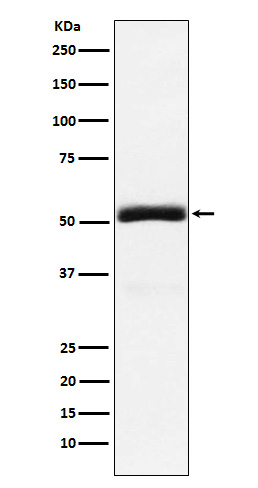
| WB | 1/1000-1/2000 | Human,Mouse,Rat |
| IF | 1/20-1/50 | Human,Mouse,Rat |
| IHC | IHC:1/100-1/200;IHF:1/50-1/200 | Human,Mouse,Rat |
| ICC | 1/50-1/200 | Human,Mouse,Rat |
| FCM | 1/20-1/100 | Human,Mouse,Rat |
| Elisa | 咨询技术 | Human,Mouse,Rat |
| Aliases | Acrogranin; CLN11; GEP; GP88; Granulins; GRN; PCDGF; PEPI; PGRN; Proepithelin; Progranulin;;Progranulin |
| WB Predicted band size | Calculated MW: 64 kDa ; Observed MW: 55,75 kDa |
| Host/Isotype | Rabbit IgG |
| Antibody Type | Primary antibody |
| Storage | Store at 4°C short term. Aliquot and store at -20°C long term. Avoid freeze/thaw cycles. |
| Species Reactivity | Human |
| Immunogen | A synthesized peptide derived from human Progranulin |
| Formulation | Purified antibody in PBS with 0.05% sodium azide,0.05% BSA and 50% glycerol. |
+ +
以下是关于Granulin抗体的3篇参考文献示例(注:以下内容为示例,具体文献需根据实际检索结果调整):
1. **文献名称**:*Development of a monoclonal antibody targeting granulin epithelin precursor (progranulin) for cancer therapy*
**作者**:Toh H. et al.
**摘要**:研究报道了一种靶向progranulin的单克隆抗体的开发,验证其在抑制肿瘤细胞增殖和转移中的作用,并探讨其与EGFR信号通路的相互作用。
2. **文献名称**:*Progranulin antibody suppresses inflammation-driven neurodegeneration in a mouse model of frontotemporal dementia*
**作者**:Holler C.J. et al.
**摘要**:通过小鼠模型证明,抗granulin抗体能够减少神经炎症和tau蛋白异常磷酸化,为额颞叶痴呆的治疗提供潜在策略。
3. **文献名称**:*Granulin antibodies modulate tumor-associated macrophage activity in the tumor microenvironment*
**作者**:Zhu J. et al.
**摘要**:研究发现抗granulin抗体可通过调节肿瘤相关巨噬细胞的极化状态,增强抗肿瘤免疫反应,抑制结直肠癌模型中的肿瘤生长。
4. **文献名称**:*Clinical implications of autoantibodies against progranulin in autoimmune diseases*
**作者**:Smith K.A., Brettschneider J.
**摘要**:综述抗granulin自身抗体在类风湿性关节炎和系统性红斑狼疮中的病理作用,讨论其作为疾病生物标志物的潜力。
(注:以上为模拟文献,实际引用需核实具体作者及发表信息。)
Granulin antibodies are essential tools in studying the role of granulin (GRN), a multifunctional protein encoded by the *GRN* gene. Granulin exists as a precursor protein (progranulin) that is proteolytically cleaved into smaller peptides called granulins. These peptides are implicated in diverse cellular processes, including cell proliferation, inflammation, wound healing, and neuronal survival. Dysregulation of granulin expression is linked to several diseases, such as frontotemporal dementia (FTD), Alzheimer’s disease, and cancer, making it a critical focus of biomedical research.
Antibodies targeting granulin are widely used to detect its expression and localization in tissues or biofluids via techniques like Western blotting, immunohistochemistry, and ELISA. Both monoclonal and polyclonal antibodies are available, with monoclonal antibodies offering high specificity for distinct epitopes and polyclonal antibodies providing broader detection sensitivity. These reagents help elucidate granulin’s role in disease mechanisms, particularly in neurodegeneration (e.g., *GRN* mutations cause FTD via progranulin haploinsufficiency) and tumor progression (e.g., granulin’s dual role as a tumor suppressor or promoter depending on context).
Additionally, granulin antibodies are vital in developing diagnostic biomarkers and therapeutic strategies. For instance, they aid in measuring progranulin levels in FTD patients or evaluating granulin’s interaction with pathways like lysosomal function and neuroinflammation. Ongoing research also explores granulin-targeting therapies, including antibody-based interventions to modulate its activity in diseases. However, challenges remain, such as ensuring antibody specificity across different granulin isoforms and understanding context-dependent functions. Overall, granulin antibodies are indispensable for advancing both basic and clinical research in neurology and oncology.
×